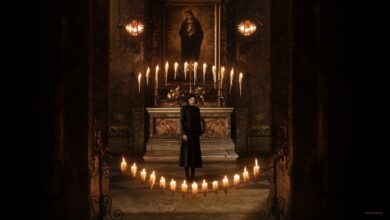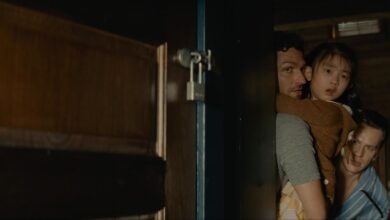God’s Crooked Lines Ending Explained: Is Alice Really Crazy? Who Was The Dead Man In The Striped Pajamas?
God’s Crooked Lines (Los renglones torcidos de Dios in original) has been a success at the Spanish box office and now it comes to Netflix, this December 6, to continue conquering viewers. If someone knows how to captivate the public, that is its director, Oriol Paulo. And just like in Misadventure and During the Storm, his endings and script twists are already iconic and celebrated among his fans. God’s Crooked Lines is based on the homonymous book by Torcuato Luca de Tena. While she allows herself various creative licenses, Alice in the book and Alice in the movie have a lot in common. Although they do differ slightly in their ending. Mainly because in a book you can develop the relationships of the characters more and in the movie, you are limited by time.
God’s Crooked Lines: Synopsis and Summary
Alice, a licensed detective, voluntarily enters a psychiatric hospital to investigate the death of a patient from the inside. The victim’s father, Federico del Olmo, has hired her to bring the truth to light. Alice feigns “paranoia” to get herself admitted. As if that were not enough, she accompanies her statement with a letter written by her family doctor where she corroborates her madness. In addition, in her statement, it also appears that she tried to poison her husband from her Heliodoro.

Once locked up in the psychiatric hospital, she begins to investigate the dead man, García del Olmo. In the center, they assure her that it was a suicide, but she will be willing to discover the truth of the whole matter. Inside there he meets very diverse people; like the brothers Rómulo y Remo or Ignacio Urquieta. In addition to serving as witnesses, he ends up becoming fond of them. But not all the inmates are equally respectful of her. EveryEveryspends in the psychiatric hospital begins to feel more insecure. And after an attempted rape and an unfounded murder accusation (Rómulo was the one who murdered the Gnome to protect her). Ella Alice decides that it is time to leave that place because she is putting her own life in danger.
The problem is that when he tries to leave the psychiatric hospital, those in charge of the center prevent him from leaving. Well, they don’t believe that she is a researcher, as she claims. They are convinced that she has set up that fantasy in her head to avoid reality. That she is crazy and that this narrative that she has invented is part of her paranoia. So, they start to medicate her more stronger. Alice will fight to try to leave that place, although it won’t be easy with Dr. Samuel Alvar on top of her. But her charisma and integrity make both the rest of the workers and the patients side with her. Because sometimes it’s easier to believe what you want to believe than to accept reality.
God’s Crooked Lines Ending Explained: Is Alice Really Crazy?
Perhaps this is the great question of God’s crooked lines. And until the end, we don’t have a definitive answer, because the movie doesn’t stop playing with us until the last scene. But yes, Alice is crazy (or mentally unstable). Indeed, Alice suffers from paranoia. It is precisely in the final scene that it is revealed. After having managed to win the trial where her release from the psychiatric hospital is at stake, a familiar face appears in the middle of the court. It is about her family doctor, Dr. Donadio, the one who accompanied her on her first day in her center and who advised her voluntary discharge out of paranoia.
In her inventiveness, she had imagined that Dr. Donadio was Federico del Olmo, the father of the boy who committed suicide and that she had hired him to investigate. But we had previously seen that Federico del Olmo was a completely different man. When Alice sees Dr. Donadio appear at the trial, even she realizes that he does suffer from paranoia and that everything has been a product of his imagination. Which makes her look completely confused at the camera.
Alice Is Admitted To The Asylum
Alice (played by a truly splendid and multifaceted Bárbara Lennie) is a beautiful and wealthy woman, married to an equally charming man, and with a brilliant career as a private detective. You are a profession that you carry out more out of passion than out of real need. The film opens with Alice who is locked up in a mental hospital to carry out investigations: the woman was hired by Dr. Raimundo García del Olmo to solve the case of the death of her son, who was hospitalized in the structure, and the doctors say – contrary to what his father believes – that he committed suicide. García del Olmo is a friend of the director of the facility, Samuel Alvar (Eduard Fernández), and for this reason, he manages to hospitalize Alice, who pretends to be a woman afflicted with psychic disorders that her husband had interned after she tried to poison him.
The extremely intelligent woman has planned everything: once she enters the asylum, she will be able to carry out her investigations “from the inside” – gathering evidence from both other patients and medical staff – and thus find out who killed García del’s son. Elm tree. When she is closed in the structure Alice immediately realizes that the case will not be as simple to solve as she hoped: among a thousand subterfuges she manages to find some clues, and imagine what could have happened – thanks to a series of flashbacks, even the viewer is transported to the night of the alleged murder – but things become increasingly intricate and complex, to the point that the woman will come to doubt her sanity. After a traumatic event, another patient tries to rape her, the unimaginable happens: the director Alvar, with whom the woman had corresponded to be admitted to the facility, says he has no idea who she is. He’s never spoken to her before, and he’s convinced that the elaborate plan she tells her – and which she says they planned together – is entirely fabricated.
Distraught, Alice confesses everything to a committee of hospital doctors who have met thanks to the insistence of Montserrat Castell, a doctor who seems more disposed than the others to believe her: Alice recounts the meeting with Dr. Raimundo García del Olmo, introduced to her by her husband Heliodorus during a New Year’s party. The man helped her develop a plan to enter the asylum, without the knowledge of her husband, who deceived and signed her papers to have her hospitalized. Even the family doctor, Dr. Donadìo, convinced himself to help her, signing a false statement about her sanity. She then left home telling Heliodorus that she was leaving for a business trip. A plan that seems to run perfectly, except that Garcia del Olmo is also present in the room, and he is not the same man Alice is convinced she has been talking to. Who did he plot all the elaborate plans with? In a panic, the woman sinks into the blackest despair, not understanding what is happening and why all her certainties of her seem to collapse.
Did Alice Try to Poison Her Husband?
Director Alvar’s theory is very simple: as Dr. Donadìo explained in his statement (which may not be as false as we imagined) the woman is a skilled manipulator, equipped with the scientific knowledge to poison the faithless husband she wants to get rid of. In Doctor Alice’s reconstruction, she poisons her husband Heliodorus on two occasions; however, after being saved by doctor Donadìo with a gastric lavage, he finds the test tube of poison that his wife was hiding, and poisons her in turn, trying to prove that she had tried to kill her. Once his theories have been confirmed, Heliodoro entrusts himself to Donadio to hospitalize Alice, whose mind – in an attempt to bear the blame for the failed murder of her husband – elaborates a complicated theory to justify her internment in a mental hospital.
The case to be solved, and the fact that Garcia del Olmo hired her, are all subterfuges of her mind to make her bear the situation she is in. Director Alvar then decides to put her through electroshock therapy, trying to cure her of her supposed insanity. After undergoing the violent treatment, however, the woman finds herself making a journey through her memories, retracing the events that preceded her hospitalization.
Was Alice Framed?
“Reviewing” as a spectator what led her to be locked up in an asylum, Alice realizes a shocking reality: her husband and the alleged Garcia del Olmo agreed from the beginning. The woman was framed in the elaborate plan of her husband, whom to get rid of her and take over her fortune, hired someone to play Garcia del Olmo, bribed the family doctor to declare her mentally ill and probably paid also the director Alvar. By having his wife locked up, the man can take possession of all his money, and with that secure accomplice.
Alice explains her theory to Montserrat and Dr. Arellano, and convinces them to check both her bank accounts – if they were empty it would confirm that her husband, whom no one can contact, ran off with his money – than that of the director Alvar, who may have in turn been corrupted by Heliodorus. Montserrat discovers that in conjunction with the woman’s entry into the structure, Alvar received a very rich check from her husband. Director Alvar sees her rummaging through her papers before she justifies herself by saying that the money was simply a donation to the hospital, nothing illegal, then the license on the spot.
Now that Alice is sure she has discovered the whole truth there is only one thing she can do: escape from the asylum and find her husband. To do this, she draws up a complicated plan with the help of the other patients in the facility: among them in particular support her is Urquieta, a man who was hospitalized for a very serious phobia of water and who from the beginning was close to her. He is the only one who has been allowed to keep a lighter, being less “dangerous” than all the other patients. And it will be starting from that lighter that Alice will kick off her plan.
The Explanation of The Ending: The Night Of The Fire
A fundamental piece for our explanation of the ending of When God learned to write is contained in what happens during the night of the fire: as we soon understand, the flashbacks we saw initially were not related to the death of García del Olmo’s son, but they were a preview of what would happen to Alice in her attempt to escape from the facility. Alice causes a fire to break out in one of the laboratories where the patients of the structure carry out their creative activities, meanwhile Urquieta – who had his cell door opened after getting his arm wet and thus causing a crisis – opens up all the cells of the other patients, who start roaming free around the hospital creating a huge mess.
Thanks to the chaos caused by the fire and the free patients, Alice manages to escape. Meanwhile, however, a terrible murder takes place inside the structure: Romulus, one of the twins with whom the woman had formed a friendship and who saw in her a mother figure, was brutally killed. It is then revealed to us that the corpse we saw in the initial (false) flashbacks was that of Romulus, killed during the chaotic escape of the patients from their cells. Alice, who feels responsible for what happened and who was very close to the victim, goes back and pretends to be the coroner who was called to analyze the body. The woman hits her doctor, Lucia, and exchanges her clothes with her. In the initial flashbacks/flashforwards, we had witnessed the arrival of the coroner, but his face had never been framed.
Analyzing Romulus’ body, and drawing on her knowledge as a private investigator, the woman understands what happened: the “elephant man” crushed him and then stabbed him with a fragment of glass. The enormous patient was a friend of Luis Ojeda, the man suffering from dwarfism who had tried to rape Alice and who was then killed by Romulus to help her, and therefore killed the boy to take revenge and because he was jealous of the woman he twins treated as if it were their little sister, with whom he is in love.
Alice, discovered by the medical staff while impersonating the coroner, manages to confirm her theory by having the hands of the “elephant man”, covered with cuts caused by the murder weapon, analyzed. The police, once they understand Alice’s great intelligence and lucidity, are willing to listen to her testimony: the woman manages to convince them – after her husband’s escape and the fact that he has stolen all her money is confirmed – that she is framed and that she was “lawfully kidnapped”. Montserrat and Arellano convene a special junta of doctors to get her out of the asylum and present a letter – signed by other staff members – asking for Alvar’s resignation for incompetence.
The Final “Process“
Alice is finally ready to be discharged, between her and freedom there is only the special junta that has been summoned. Before going to the “trial” the woman makes a further discovery: it was not Romulus who was killed during the night of the fire, but her twin Remus. The latter was in his brother’s room while he went to help his little sister, and for this, he had been mistaken for Romulus and killed by the “elephant man”.
During the junta, everything seems to turn in Alice’s favor: Dr. Alvar voluntarily resigns and abstains from voting to make her resign. He is still deeply convinced that the woman is not as sane as she says and – after the others have voted in her favor – he makes one last revelation: Doctor Donadìo, whose unattainability had been used by Alice as evidence to confirm the fact that he had been corrupted by her husband, corroborating her thesis, he was simply on vacation with his family. For this, he had never replied to the telegrams that had been sent to him from the hospital. However, Alvar managed to contact him and took him there to the hospital to participate in the special junta.
Does Donadio Confirm Alice’s Madness?
The arrival of Donadìo reshuffles all the cards on the table: the man is the same one that in her memories Alice saw as the (false) García del Olmo. He was Donadìo, the family doctor whose face we had never seen for the rest of the film. This confirms that Alice has created a completely fictitious version of events in her mind and that perhaps the theory supported by Alvar, that of the woman’s madness and the fact that she tried to poison her husband to get rid of him, was always the reality. From this point of view, the fact that Heliodorus emptied Alice’s bank accounts no longer even seems such a crushing proof: once he had his wife locked up – for just cause – what prevented him from taking possession of her fortune and enjoying life? All the different versions of the story, created by Alice’s mind, seem overwhelming proof that she has manipulated reality to fit the narrative that best suited her: first, the one in which she was hired to investigate a murder, then the fact that her husband had framed her to free himself of her and take possession of her money. Her mind created justifications for the terrible crime she almost committed, the murder of her husband for which she was caught.
That said, though, we can always believe Alice’s version. If we assume that Heliodoro hired a fake García del Olmo, and then bribed both Donadìo and Alvar, he could also have asked the same person who initially played García del Olmo to play Donadìo (with Alvar’s collaboration perhaps), to make the doctors believe again that Alice had made it all up. Although the ending shows us an extremely confused Alice in front of the newcomer, it is never confirmed that she recognizes him as Doctor Donadìo. We don’t have certain proof, therefore, that he is who he says he is. The decision as to what the definitive truth is is therefore left to the viewer, who can choose to believe in Alvar and Donadìo, and therefore in Alice’s madness, or to still believe in the woman, who may have been framed in an extremely elaborate plan against her. Who is the real fool and who is the sane?
Differences Between the End Of The Book And The End Of The Movie
Although the film lasts two and a half hours. You can always develop the story further in the books. And that is precisely what happens in God’s Crooked Lines. They both share Alice’s condition. Both in the book and the movie, it is shown at the end that she does suffer from paranoia and is crazy. But while in the book she leaves open the reason for her paranoia, in the book they tell you about the exact reasons for her state of mind. The book tells you that Alice’s husband, Stink, married her for her money. Money was stolen little by little. Also, he turned her house into a brothel. This situation ended up breaking the woman and driving her crazy. She to the point of inventing another reality to support it.
Also, in the book, Alice tried to poison her husband. But although the truth is discovered, from the center of her they decide to free her from her, justifying that this paranoia had only occurred because of her husband, but that as long as she does not get close to him, she will not happen again. The problem is that when Alice leaves the asylum, her health begins to deteriorate. She has become so fond of the patients and the employees that she feels that this is her place in the world. So she decides to return, but no longer as a patient, but as a nurse, to help the people who are institutionalized there.
Who Was The Dead Man In The Striped Pajamas?
But Alice‘s condition isn’t the only mystery that surrounds the film. Curiously, the film begins with an accident one rainy night. When thinking that the film is linear, we assume that it is the case that Alice, that of García del Olmo, enters to investigate. And that the boy in the pajamas is Ricardo del Olmo. But halfway through the film, we realize that in truth the beginning was an event of the future. And that rainy night is precisely the one in which Alice tries to escape. She is the one who causes the fire to distract the attention of the psychiatric workers.
But that same distraction causes one of the inmates to kill another that night. The Elephant Man murders Remo in cold blood thinking it was Remulus, his twin brother (he hates him because he killed his friend protecting Alice). Alice feels responsible and so she decides to return to the center to help solve the crime.






